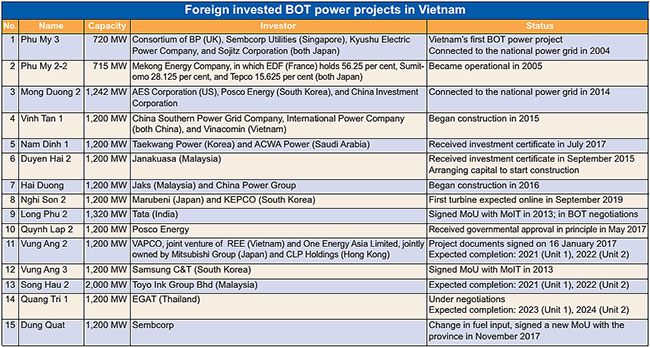BOT power projects gain momentum
 |
A source from Sumitomo told VIR that the firm is finalising a build-operate-transfer (BOT) contract with the Ministry of Industry and Trade after getting an investment registration certificate in November. In the same month, Toyo Ink signed an agreement with Hau Giang province on land leasing for the Song Hau 2 project.
BOT contract procedures on the Sumitomo plant are expected to finish in 2018, taking the firm one step closer to breaking ground on its thermal power plant in the central province of Khanh Hoa, the source said.
In November 2009, Sumitomo officially announced that it would embark on an electric power generation project, Van Phong 1 in Van Phong Economic Zone of the province. The investment project was expected to cost a total of 200 billion yen ($2.19 billion).
Initially, Sumitomo had plans to complete the plant’s construction and start commercial operations in 2015. However, as the negotiation process dragged on, the timeline was also extended. Electricity sale prices and foreign currency conversion rates were the main bones of contention during the negotiation process.
As Sumitomo would be converting project revenue from dong to dollars, it sought a guarantee on currency conversion rates. As such, under Document No.1604/TTg-KTN, the government offered a guarantee on 30 per cent of project revenue from VND to USD. However, Sumitomo was not content with this offer, and instead requested a guarantee for 100 per cent of its foreign currency exchange. At present, it is unclear how this issue has been resolved.
In other developments, Toyo Ink was reported to have entered into a new memorandum of agreement (MoA) last month with the Hau Giang Department of Natural Resources and Environment for the development of its power plant project in Vietnam.
The new MoA replaces an earlier MoA in January 16, 2017. This current MoA came into effect on the date of its execution and will last until Aug 31, 2018, or the date of signing the BOT contract, whichever comes first.
“Toyo Ink will use commercially reasonable efforts to reach agreements on all outstanding terms and issues relating to the BOT contract and the power purchase agreement in good faith and as soon as possible. It estimates that this can be completed by August 2018,” said the firm’s report.
The 2,000-megawatt (MW) Song Hau 2 coal-fired power plant is part of the 5,200MW Song Hau Power Centre in Hau Giang Industrial Park. This complex will comprise three power plants, including the 600MW Song Hau 1 plant, built by Vietnam’s state-owned oil and gas group PetroVietnam.
The project is invested with $3.5 billion and has a concession period of 25 years. It plans to use imported coal for fuel.
Previously, Toyo Ink announced that it called for partners to join on the Song Hau 2 venture in order to reduce capital pressure. Lenders have lately been tightening loans for thermal power. The firm did not respond to VIR’s request for comment on this issue.
According to the Ministry of Industry and Trade, the nation needs to add an additional 36,000MW from thermal power plants to the supply system by 2020 to ensure power security. The country’s growing demand for power is encouraging more and more foreign power companies to invest in Vietnam.
This year, the power sector witnessed positive movement in many BOT thermal power projects, including the $2 billion Nam Dinh power plant, developed by Saudi Arabia’s ACWA Power International and South Korea’s Taekwang Power, and the $2.2 billion Nghi Son 2 thermal power plant, developed by Japan’s Marubeni Corporation and Korea Electric Power Company (KEPCO).
What the stars mean:
★ Poor ★ ★ Promising ★★★ Good ★★★★ Very good ★★★★★ Exceptional
Latest News
More News
- Site clearance work launched for Dung Quat refinery upgrade (February 04, 2026 | 18:06)
- Masan High-Tech Materials reports profit: a view from Nui Phao mine (February 04, 2026 | 16:13)
- Hermes joins Long Thanh cargo terminal development (February 04, 2026 | 15:59)
- SCG enhances production and distribution in Vietnam (February 04, 2026 | 08:00)
- UNIVACCO strengthens Asia expansion with Vietnam facility (February 03, 2026 | 08:00)
- Cai Mep Ha Port project wins approval with $1.95bn investment (February 02, 2026 | 16:17)
- Repositioning Vietnam in Asia’s manufacturing race (February 02, 2026 | 16:00)
- Manufacturing growth remains solid in early 2026 (February 02, 2026 | 15:28)
- Navigating venture capital trends across the continent (February 02, 2026 | 14:00)
- Motivations to achieve high growth (February 02, 2026 | 11:00)
















 Mobile Version
Mobile Version